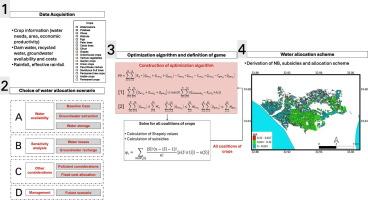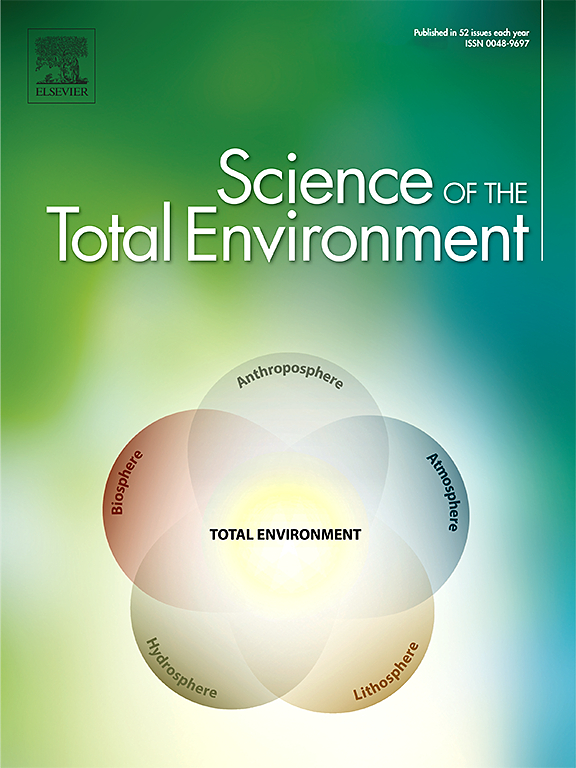可持续农业用水分配的博弈论框架:提高阿克罗蒂里地区(塞浦路斯)的经济和用水效率
IF 8
1区 环境科学与生态学
Q1 ENVIRONMENTAL SCIENCES
引用次数: 0
摘要
在包括塞浦路斯在内的地中海国家,水资源短缺是一个日益严重的问题,气候变化、人口增长、快速城市化和经济发展给水资源带来了巨大压力。本研究的重点是优化Akrotiri地区农业用循环水的分配,通过考虑常规和非常规水资源,使用博弈论方法最大化与作物生产相关的净效益(NB)。本文开发了一个线性优化框架,其中18种作物在合作博弈中扮演玩家的角色,形成了一个整体利益和成本共享模型。最优水量分配方案优先考虑经济生产力高、需水量少的作物,提高可持续性和盈利能力。根据2022年可用的灌溉用水(基线情况),新预算为2300万欧元,而来自外部实体的所需补贴为200万欧元。通过管理含水层补给(MAR)进行地下水补给被纳入一个方案,导致类似的NB,但将补贴增加到350万欧元。其他情景探讨了老化基础设施造成的损失(补贴增加高达70%),由于污染物的存在造成的水质限制(NB和补贴分别为1500万欧元和400万欧元),各种储存策略(补贴减少约20%的基线值)以及基于预测气候条件的未来情景,导致最高补贴近900万欧元。该方法为政策制定者和规划者提供了一个强有力的决策工具,有助于在不确定的未来气候条件下处理复杂的水资源分配问题。本文章由计算机程序翻译,如有差异,请以英文原文为准。

A game-theoretic framework for sustainable water allocation in agriculture: Enhancing economic and water efficiency in Akrotiri district (Cyprus)
Water scarcity is an escalating issue in Mediterranean countries, including Cyprus, where climate change, population growth, rapid urbanization, and economic development place significant pressure on water resources. This study focuses on optimizing the allocation of recycled water for agricultural use in the Akrotiri district, using a game theory approach to maximize net benefits (NB) associated with crop production by considering conventional and nonconventional water resources. A linear optimization framework is developed in which eighteen crop types act as players in a cooperative game, contributing to an overall benefit- and cost-sharing model. Optimal water allocation schemes prioritize crops with high economic productivity and low water demand, enhancing both sustainability and profitability. Based on the available water for irrigation in 2022 (baseline case), the NB is 23 million euros whereas the required subsidies, sourced from external entities, amount to 2 million euros. Groundwater recharge via managed aquifer recharge (MAR) is included as a scenario leading to a similar NB but increases subsidies to 3.5 million euros. Additional scenarios explore losses from aging infrastructure (increase of subsidies up to 70 %), water quality constraints due to the presence of pollutants (NB and subsidies are 15 and 4 million euros, respectively), various storage strategies (reduction of subsidies about 20 % of the baseline value) and future scenarios based on projected climatic conditions, resulting in the highest subsidies of nearly 9 million euros. This methodology offers a robust decision-making tool for policymakers and planners, helping to navigate the complexities of water allocation under uncertain future climatic conditions.
求助全文
通过发布文献求助,成功后即可免费获取论文全文。
去求助
来源期刊

Science of the Total Environment
环境科学-环境科学
CiteScore
17.60
自引率
10.20%
发文量
8726
审稿时长
2.4 months
期刊介绍:
The Science of the Total Environment is an international journal dedicated to scientific research on the environment and its interaction with humanity. It covers a wide range of disciplines and seeks to publish innovative, hypothesis-driven, and impactful research that explores the entire environment, including the atmosphere, lithosphere, hydrosphere, biosphere, and anthroposphere.
The journal's updated Aims & Scope emphasizes the importance of interdisciplinary environmental research with broad impact. Priority is given to studies that advance fundamental understanding and explore the interconnectedness of multiple environmental spheres. Field studies are preferred, while laboratory experiments must demonstrate significant methodological advancements or mechanistic insights with direct relevance to the environment.
 求助内容:
求助内容: 应助结果提醒方式:
应助结果提醒方式:


